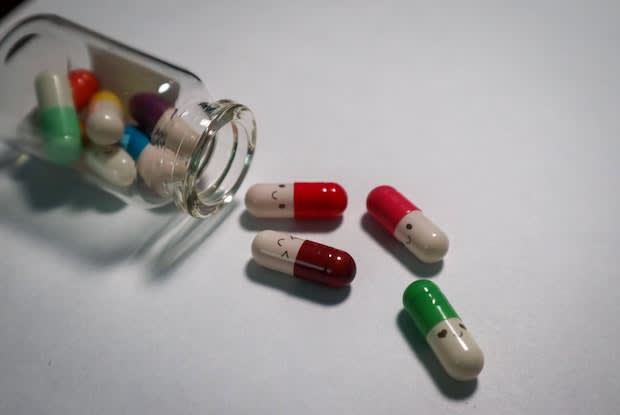Table of Contents
I. The Psychological Impact on IBS Symptoms
II. What is an Impacted Bowel?
III. Avoiding Triggers can Lead to Malnourishment
IV. How Does Pregnancy Worsen IBS Symptoms?
V. Anal Fissures, Rectal Prolapse, and Hemorrhoids
Irritable bowel syndrome (IBS) is a chronic condition with a host of symptoms, including constipation, diarrhea, bloating, and abdominal discomfort. There is no cure for IBS, but treatment is necessary to prevent symptoms from worsening and causing health complications.
If you are diagnosed with IBS, your doctor may prescribe Linzess (linaclotide) or lubiprostone for constipation and Xifaxan (rifaximin) for diarrhea. These antibiotics and laxatives are effective for IBS management, but complications may still occur from factors outside of your control. Read on to learn about the most common psychological and physical complications of IBS. [1]
The Psychological Impact on IBS Symptoms
Because IBS symptoms can affect you suddenly, they can significantly disrupt your work or social life. Many people with IBS reduce how much they go out because random flare-ups can cause stress. Allowing this stress to build up long-term may result in mental health conditions like anxiety and depression. [2]
Anxiety and depression are serious psychological conditions that should never be ignored. Occasionally feeling low is normal, but long-term depression can lead to even more severe complications like heart attacks, insomnia, and memory loss. Your brain, nervous system, and the nerves in your gut are all linked. The more stress you feel, the worse your symptoms can get. The worse your symptoms get, the more stress you will feel. To prevent mood disorders, it is important to talk to your doctor about managing stress. Medications that fight diarrhea can allow you to go about your daily activities with less worry of flare-ups. [3] If your IBS symptoms tend to cause more constipation than diarrhea, you may be at risk of a complication known as fecal impaction. Fecal impaction, also called an impacted bowel, occurs when too much stool is blocked in the colon for too long. This causes the stool to pack together tightly, resulting in severe and prolonged constipation. An impacted bowel commonly causes symptoms of headache and nausea. In severe instances, manual removal of the impacted stool is required. [2] People with IBS often need to avoid certain foods to avoid triggering their symptoms. A diet low in lactose, fructose, and artificial sweeteners can improve IBS symptoms, but this can sometimes come at the cost of essential vitamins and minerals. For example, many fruits and vegetables contain necessary nutrients but also fructose. Cow’s milk contains calcium and protein but also lactose. To avoid not getting enough nutrition, or malnourishment, it is essential to ask your dietician for ways to avoid triggers while ensuring a healthy, all-around diet. Malnourishment is a complication that is fairly simple to fix if addressed promptly. Talk to your doctor for ways to avoid food triggers without sacrificing the strength of your immune system. [4] In more ways than one, IBS affects women and men differently. For example, IBS symptoms may increase during menstrual cycles. But women who are pregnant should take extra care to prevent IBS-related pregnancy complications. The physical strain of carrying a baby can put pressure on the bowel walls. Pregnant women also tend to pause their IBS treatment plan for the benefit of the baby, which can lead to heartburn and indigestion. [2] Long-term and persistent constipation can result in small tears in the anus called anal fissures. Anal fissures commonly cause rectal pain and bleeding, along with symptoms of severe itching and discomfort. When you have constipation, the wounds of anal fissures are constantly in contact with the bacteria in your stool. This can cause them to take a long time to heal. [5] IBS can also cause a complication known as rectal prolapse, which occurs when the rectum becomes unattached from the inside of the body. If this occurs, the rectum will turn “inside-out” and exit the anus. This complication can significantly affect the quality of life. Although rectal prolapse isn’t a life-threatening condition, surgery is often required to re-attach the rectum. [6] A common complication of IBS is hemorrhoids. Hemorrhoids may occur in people without IBS as well, but this not as common. Constipation in IBS patients can lead to swelling of the blood vessels around the anus. Hemorrhoids can be mildly inflamed, but they can also become severely aggravated. If you have severe hemorrhoids, you may experience rectal bleeding and increased pain during bowel movements. [5] Many IBS complications are often directly connected to constipation or diarrhea. By relieving constipation and treating diarrhea, prescription medications can help to prevent these complications. With the right treatment plan and execution, IBS is a manageable condition that can be well-controlled. Your doctor will be able to give you a proper diagnosis and prescribe the right irritable bowel syndrome medications. The content in this article is intended for informational purposes only. This website does not provide medical advice. In all circumstances, you should always seek the advice of your physician and/or other qualified health professionals(s) for drug, medical condition, or treatment advice. The content provided on this website is not a substitute for professional medical advice, diagnosis, or treatment.
What is an Impacted Bowel?
Avoiding Triggers can Lead to Malnourishment

How Does Pregnancy Worsen IBS Symptoms?
Anal Fissures, Rectal Prolapse, and Hemorrhoids

Long-Term Outlook for IBS
